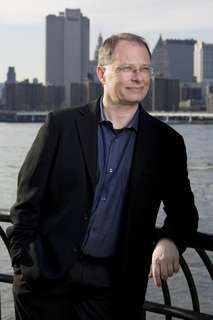|
Back
Space Chronicles New York
Avery Fisher Hall, Lincoln Center
07/20/2010 -
Edgard Varèse: Ionisation – Octandre – Tuning Up (completed by Chou Wen-chung) – Arcana – Nocturnal (completed by Chou Wen–chung) – Amériques
Anu Komsi (Soprano)
Oratorio Society, Kent Trittle (Chorus Master), New York Philharmonic Orchestra with guest percussionists, Alan Gilbert (Conductor)

A. Komsi (© Maarit Kytöharj)
Few composers can beat the ratio of works to number of notes like Edgard Varèse. True, most of his early pieces were burned in a fire, but his complete opus–10 pieces Monday night, six last night–make up the entire collection of Varèse.
Still, those who joined the sold-out houses both nights were experiencing one of the most astonishing composers of the 20th Century, a composer who not only didn’t follow any rules, but who insisted that every composer had to make up his own rules, lest he/she not be worthy of the name composer.
In that sense, the cutesy title of these two nights, “R(evolution)” was a two–way misnomer. He didn’t evolve (save evolving from his Impressionistic very early works), and he didn’t revolt, since he had nobody to revolt against. Varèse went his own way.
His works are certainly recognizable, but the two evenings were vastly different. Monday evening’s concert by the International Contemporary Ensemble was ice-pick sharp, the young performers alive, electric, aware of every hemidemisemiquaver, every dynamic from sfffffz to ppppp (often in the same measure). This was not light music (save three or four measures of mock-Broadway music in Music For Burgess, but nothing was sanctimonious or heavy. It was an apocalypse of education.
Last night, the music was (to say the least) unconventional, but shocks and apparitions were gone. This was not the fault of Alan Gilbert, who–since the Ligeti opera last month–is now one of the wonders of both modern and mainstream. Nor of the Philharmonic Orchestra itself, which played well.
Perhaps because many of the works were for full orchestra, perhaps the acoustics of Avery Fisher Hall, but something made the music interesting, but not electrifying.

K. Tritle (© Jennifer Jackson)
With exceptions, of course. Kent Tritle had directed the basses of the Oratorio Society so brilliantly that their words, from the Anaïs Nin House of Incest in Nocturnal were terrifying. Before Monday, I had never listened so carefully to Varèse’s choral and vocal work, but he understood words as well as music, he knew the effects of strong choral singing with orchestra, and this showed.
The Finnish soprano Anu Komsi had some stunning solos here, one of which left her swooping to a high C, and holding it through every vocal modulation a bravura performance of a very great work. Yes, the piece was unfinished by Varèse, but Chou Wen-chung apparently did a good job of reproduction.
Amériques, was the longest and most sumptuous, and for this, Mr. Gilbert finally made his whole orchestra bang out in tip-top fashion: the great brass choruses, the endless series of false endings, and climax upon climax. Admittedly, the fire sirens (Varèse insisted on New York Fire Department sirens) sounded a bit dated. But Amériques nothing else shows its age here. Varèse, after all, thought of America in the same way Kafka–who never visited the country–pictured Amerika. Not as North or South or Central, but all of these and the America of the endless potential. As he wrote in his diaries once. “America is discovery, adventure, the unknown new world, outer space, the mind of man.”
My favorite was Tuning Up, written originally for a film called Carnegie Hall. Varèse was asked to write a “parody” of tuning up an orchestra. But Varèse was no parodist, and he apparently frightened the producer.
(This was where Piatagorsky not only played The Swan on cello, but a dozen women on harps backed him up!! One can understand why Varèse was not exactly appropriate.)
Instead we have the usual tuning up (the oboe’s A continuing through almost the whole piece), the strings continuing in open strings, and the orchestra intimating all kinds of older music, from Varèse’s own works (a light-hearted Heldenleben) to a measure of Marseilles.
True, Varèse could be compared to no other composer, but Charles Ives could easily have written this music.
The evening started with the now famous Ionisation, with 13 percussionists (14 including the piano) whistled, reverberated and shook all the way to the military ending. Following that were Octandre (a meticulous chamber group) and Arcana, with the full orchestra.
(Etymological trivia: Octandre is not a portmanteau for octet, though eight are playing. It is the word for a plant or flower with eight stamens. Did Varèse want to make this sexually titillating?)
If the New York Philharmonic program didn’t give the startling impression of Monday, the blame cannot lie with the composer. Outside of those infernal sirens. Ye complete Varèse is a magnum of opus of constant surprises, consistent high-voltage sounds, and (his own words), “Explosions in space.”
Harry Rolnick
|